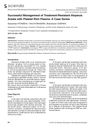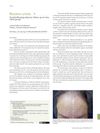54 citations,
September 2012 in “Acta ophthalmologica” Cancer treatments can cause various eye problems, so eye doctors should know how to diagnose and treat these early.
 January 2021 in “International journal of basic and clinical pharmacology”
January 2021 in “International journal of basic and clinical pharmacology” Hydroxychloroquine is less effective than betamethasone oral mini pulse therapy for treating alopecia areata.
 2 citations,
June 2019 in “Serbian Journal of Dermatology and Venereology/Serbian Journal of Dermatology and Venerology”
2 citations,
June 2019 in “Serbian Journal of Dermatology and Venereology/Serbian Journal of Dermatology and Venerology” Platelet-rich plasma injections can effectively treat stubborn alopecia areata.
 11 citations,
October 2016 in “Pediatric dermatology”
11 citations,
October 2016 in “Pediatric dermatology” Stopping the use of fluocinolone oil containing balsam fragrance improved hair regrowth in children allergic to it.
 May 2019 in “Anais brasileiros de dermatologia/Anais Brasileiros de Dermatologia”
May 2019 in “Anais brasileiros de dermatologia/Anais Brasileiros de Dermatologia” Frontal fibrosing alopecia mostly affects postmenopausal women, with diagnosis often delayed by 3 years.
June 2023 in “Clinical Cosmetic and Investigational Dermatology” The new technique effectively treats hairline vitiligo with repigmentation and hair regrowth.
 February 2006 in “Journal of The American Academy of Dermatology”
February 2006 in “Journal of The American Academy of Dermatology” Terbinafine is more effective than itraconazole for toenail fungus, especially in older patients, and debridement improves its effectiveness.
87 citations,
March 2013 in “Expert Review of Anticancer Therapy” Afatinib often causes skin problems that need proactive management.
 38 citations,
July 2010 in “Clinical, cosmetic and investigational dermatology”
38 citations,
July 2010 in “Clinical, cosmetic and investigational dermatology” To treat tinea capitis in children, oral antifungal medication is necessary, with newer drugs offering shorter treatment times than the traditional griseofulvin.
31 citations,
March 2014 in “Journal of the European Academy of Dermatology and Venereology” BRAF inhibitors for melanoma often cause skin side effects, but they can be managed with proper care.

Doctors should consider Netherton syndrome in patients with chronic skin and hair issues to avoid misdiagnosis.
 April 1906 in “The American Journal of the Medical Sciences”
April 1906 in “The American Journal of the Medical Sciences” Keratosis Pilaris Atrophicans causes skin scarring and might be treated with a new synthetic retinoid.
 3 citations,
January 2008 in “Journal of the American Academy of Dermatology”
3 citations,
January 2008 in “Journal of the American Academy of Dermatology” A patient's skin rash did not affect the area where a previous viral rash was healing, suggesting a rare immune response.
 3 citations,
September 2018 in “Dermatologic Surgery”
3 citations,
September 2018 in “Dermatologic Surgery” Platelet-Rich Plasma (PRP) can improve hair loss in cicatricial alopecia cases, but treatment must be ongoing and results vary among patients.
 130 citations,
January 2005 in “American Journal of Clinical Dermatology”
130 citations,
January 2005 in “American Journal of Clinical Dermatology” Eating disorders like anorexia and bulimia cause skin problems, and dermatologists can help detect these disorders early for better treatment outcomes.
 8 citations,
July 2018 in “European Journal of Dermatology”
8 citations,
July 2018 in “European Journal of Dermatology” A medication may help with hair growth in psoriasis, and a skin condition might be linked to a specific bacteria.
 1 citations,
July 2024 in “Journal of the European Academy of Dermatology and Venereology”
1 citations,
July 2024 in “Journal of the European Academy of Dermatology and Venereology” Oral dutasteride is effective and safe for treating frontal fibrosing alopecia.
 15 citations,
November 2012 in “International Journal of Dermatology”
15 citations,
November 2012 in “International Journal of Dermatology” The conclusion is that hair loss from CCCA may be genetic and not solely caused by hair grooming practices.
 December 2015 in “Journal of Psoriasis and Psoriatic Arthritis”
December 2015 in “Journal of Psoriasis and Psoriatic Arthritis” A patient experienced long-lasting hair loss after using acitretin for psoriasis.
 3 citations,
March 2021 in “Clinical, Cosmetic and Investigational Dermatology”
3 citations,
March 2021 in “Clinical, Cosmetic and Investigational Dermatology” Early treatment of Lupus Erythematosus Alopecia can prevent permanent hair loss, and various medications are effective.
 September 1997 in “JEADV. Journal of the European Academy of Dermatology and Venereology/Journal of the European Academy of Dermatology and Venereology”
September 1997 in “JEADV. Journal of the European Academy of Dermatology and Venereology/Journal of the European Academy of Dermatology and Venereology” Psychological factors play a significant role in developing alopecia areata.
 9 citations,
January 2005 in “Pediatric Dermatology”
9 citations,
January 2005 in “Pediatric Dermatology” Fox Fordyce disease can occur in prepubertal girls and may be underdiagnosed.
 16 citations,
January 2005 in “Pediatric Dermatology”
16 citations,
January 2005 in “Pediatric Dermatology” A 10-year-old girl with Fox Fordyce disease improved with treatment, suggesting the disease can occur before puberty and might be underdiagnosed in young girls.
 January 2018 in “Springer eBooks”
January 2018 in “Springer eBooks” PDE inhibitors, especially PDE4 inhibitors like apremilast, are effective for certain inflammatory skin conditions but have side effects and can be costly.
 2 citations,
January 2015 in “Springer eBooks”
2 citations,
January 2015 in “Springer eBooks” Early diagnosis and aggressive treatment are crucial for Cicatricial Alopecia, and treatment effectiveness varies among patients.
71 citations,
January 2011 in “Journal of cutaneous pathology” A rare skin condition was confirmed to be associated with a specific virus in a young girl.
 2 citations,
February 2023 in “Journal of The American Academy of Dermatology”
2 citations,
February 2023 in “Journal of The American Academy of Dermatology” Scalp biopsies greatly improved diagnosis and treatment for Black women with unclear alopecia.
 1 citations,
February 1977 in “Archives of Dermatology”
1 citations,
February 1977 in “Archives of Dermatology” Fresh plasma transfusions did not help treat Leiner disease in an infant.
 August 2023 in “International Journal of Women's Dermatology”
August 2023 in “International Journal of Women's Dermatology” Wearing a high-quality wig improved a woman's mood and life quality, and the authors suggest insurance should cover the cost of wigs.
8 citations,
January 2019 in “JAAD Case Reports” EPDS can cause recurring scalp sores and hair loss if not treated.























